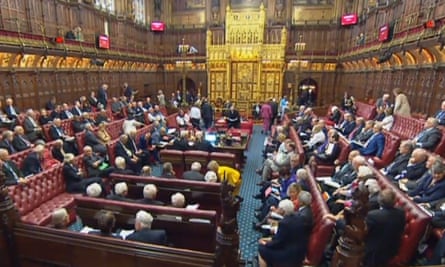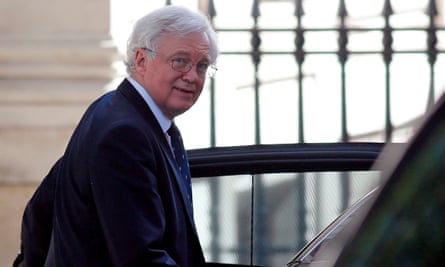The hard Brexiters have a peculiar way of expressing their patriotism. They proclaim an unsurpassed love for Britain while trashing its institutions with an unbridled hatred. The supreme court, the Bank of England and the civil service have all felt the white heat of the hard Brexiters’ incontinent rage. The BBC is another of their “enemies of the people”, as are any parliamentary colleagues who have the temerity not to subscribe to the fundamentalism of the true believers. “Traitors”, “wreckers” and “saboteurs” all.
The latest target for their furies is the House of Lords, because peers have performed their function by suggesting some changes to the withdrawal legislation. A particular focus of Brexteria is the 9th Duke of Wellington, who sits in the claret chamber thanks to the hereditary title that was bestowed on his long-dead ancestor as a reward for battling Napoleon Bonaparte. The 9th duke’s contribution was to table a successful amendment that removes the March 2019 deadline for departure from the EU. This is not such an unreasonable idea given where we have got to or, rather, not got to.
There are just 10 months remaining before Britain is scheduled to leave and the negotiations with Brussels are stalled while the cabinet continues to quarrel with itself about the customs issue. The proposal favoured by Theresa May is publicly described as “crazy” by the foreign secretary. Attacking the prime minister so insolently would normally be a sackable offence, but Mrs May flinches from firing Boris Johnson because she fears that one false move might ignite the unstable pile of nitroglycerine called the Tory party upon which she precariously squats.
The so-called “Brexit war cabinet” is at war with itself over what sort of customs arrangement to try to negotiate with the EU. To make this split even more surreal, while ministers squabble furiously about whether they should try for a “customs partnership” or pursue a hard Brexiter alternative called “max fac”, the EU has already said that it doesn’t think either of these notions is airworthy. The government is running so short of time that it might ultimately find itself grateful that peers have suggested the possibility of delaying the exit date.

Altogether, the Lords have made 14 amendments to the withdrawal legislation. The thanks they have received from the hard Brexiters is to be blasted with spleen-busting denunciation, accompanied by dark warnings to peers that there will be “a reckoning”. Bernard Jenkin rages against the Lords for its “defiance”. With mafiosi-like menace, Jacob Rees-Mogg hisses: “It is not a loved institution… It raises the issues of reform.”
On this we can agree. In a less absurd world, the 9th Duke of Wellington wouldn’t be sitting in parliament. It is beyond ridiculous and all the stations to absolutely ludicrous that you get to occupy a seat in one half of our legislature because of the military feats performed by an ancestor more than two centuries ago. You wouldn’t trust your brain to a neurosurgeon whose only qualification for the title was that his great-great-great-grandfather was a neurosurgeon. Yet Britain’s uniquely comical set-up still reserves seats in its parliament for hereditary legislators. The rest of the upper house, the “life peers”, are appointees of highly variable merit, ranging from those who have distinguished themselves in other walks of life to those who have distinguished themselves by being long-pocketed donors to political parties.
If Britain had ever found the time and energy to write itself a rational constitution, we would have a more democratically legitimate upper house of parliament. Then again, if Britain had ever got round to writing itself a rational constitution, it wouldn’t have embarked on something with such seismic and far-reaching consequences as Brexit on the basis of a narrow majority of voters representing a minority of the total electorate in one plebiscite on one particular Thursday in one particular month of one particular year called by one particularly panicky prime minister because David Cameron thought it would get him through his difficulties with his party.
It is not the hereditary peers’ fault that we do not have a sensible constitution, any more than they are to blame for the absurdity that 92 of them still have reserved seats in the ermine-wearing wing of parliament. They would be long gone had they been given their marching orders. The failure lies with the Commons for not reforming the Lords on the many occasions when there has been an opportunity to do so. It is the particular fault of those MPs who have previously used every dodgy argument in defence of unelected privilege to thwart attempts to democratise the upper house.

The last effort was in the coalition years, when Nick Clegg, with tepid support from Mr Cameron, brought forward legislation which proposed that the Lords be replaced with an 80% elected chamber. That attempt at reform was sabotaged by a rebellion by Conservative backbenchers. And who was prominent in that revolt against democracy? Among the names were one Bernard Jenkin and one Jacob Rees-Mogg, the very same Jenkin and the very same Rees-Mogg who now fulminate against the unelected peers they previously battled to preserve. Also among the saboteurs were Nadine Dorries, Peter Bone, Steve Baker, Bill Cash and other hard Brexiters who now pose as tribunes of the people. Oh, and we shouldn’t forget that David Davis, the Brexit secretary himself, was one too, along with the Brexiter press that now bellows about the “treachery” of the upper house.
Peers are not a terribly good embodiment of public opinion. That is absolutely true. But they are probably a better representation of public opinion than the European Research Group, Mr Rees-Mogg’s hard Brexit cabal of 60 Tory MPs who try to blackmail Mrs May with threats to her premiership if she does not subscribe to their interpretation of the referendum result. The peers’ role, as it has evolved, is not to block the Commons, but to ask MPs to have another think. The Lords can make revisions when they think ministers are doing something stupid or reckless. They also have a role to perform when governments attempt things for which there is no clear mandate or that risks the national interest. This occurs quite a lot, so some body, however imperfect, must have this cautioning function. Ultimate power still rests with the Commons. The Commons is the train. The Lords have a brake. Peers can slow down governments, but they don’t stop them. When MPs insist, peers invariably give way.
That is the reason why it has suited governments to keep things this way because, without the legitimacy of election, the Lords will never absolutely defy the Commons. I suspect that if we had an elected upper house, with a membership roughly proportionate to the support each party received at the most recent general election, the replacements for peers would be amending more of the Brexit legislation and more assertively.
Another unwritten function of the Lords is to oblige the Commons to address issues that the government would rather swerve. One change to the withdrawal legislation, promoted by Chris Patten, the former Conservative cabinet minister, requires any Brexit deal to honour the Good Friday agreement. Other amendments seek to restrain ministers from making post-Brexit law without proper consultation with parliament. The Lords have also voted to keep Britain in a customs union and to retain access to the single market.
When this legislation comes back before MPs, the Commons will be free to accept or delete these amendments. Peers know it looks bad if they try to frustrate the wishes of the elected house and so will almost certainly bend to the desires of the Commons in the end. I am sure the hard Brexiters know this. Their fury with the Lords is not just hypocritical, it is synthetic. It is anger of the displaced variety. What they really cannot stand is the thought that MPs may well decide to embrace at least some of the changes made by peers. It is not the government’s lack of a majority in the upper house that is the real problem for the hard Brexiters – it is their lack of a majority in the Commons for a hard Brexit.
It is pleasing, at least, to see their eyes opening to the virtues of democracy. Today, we report that organisations representing a million students are adding their voices to the calls for the country to have the final say on whatever exit deal the government finally comes back with. After their sudden conversion against unelected privilege and in favour of democracy, perhaps we will see Jacob Rees-Mogg and his friends joining the next march for a people’s vote.

